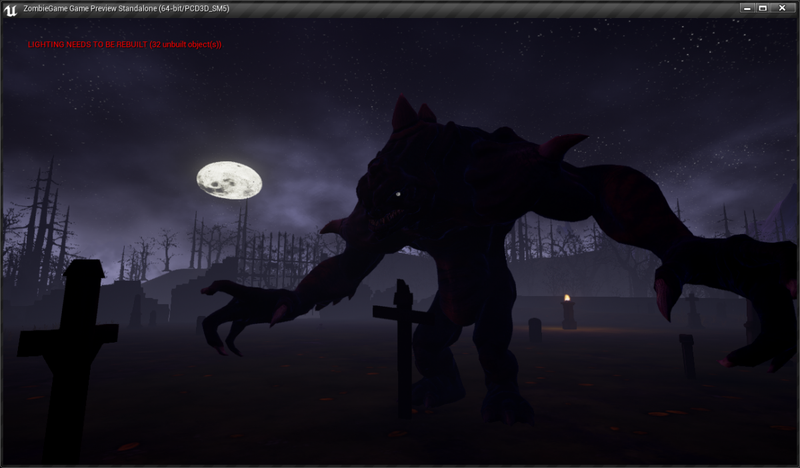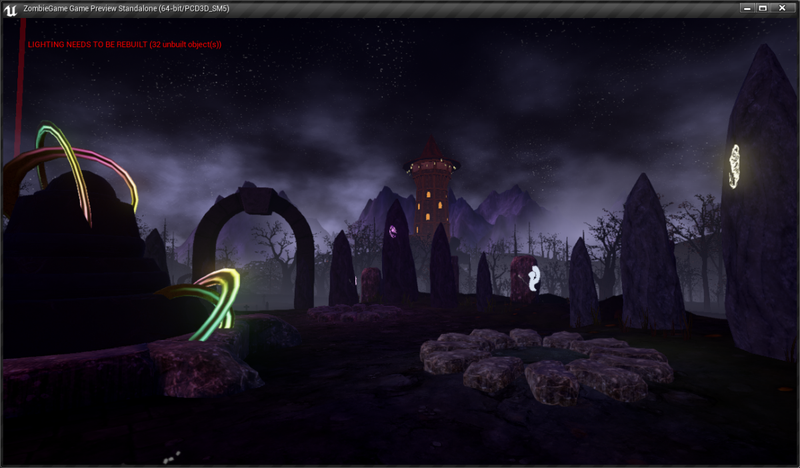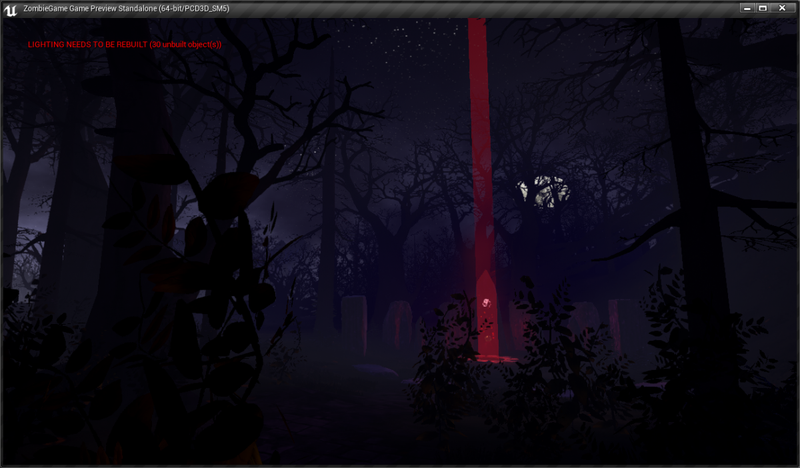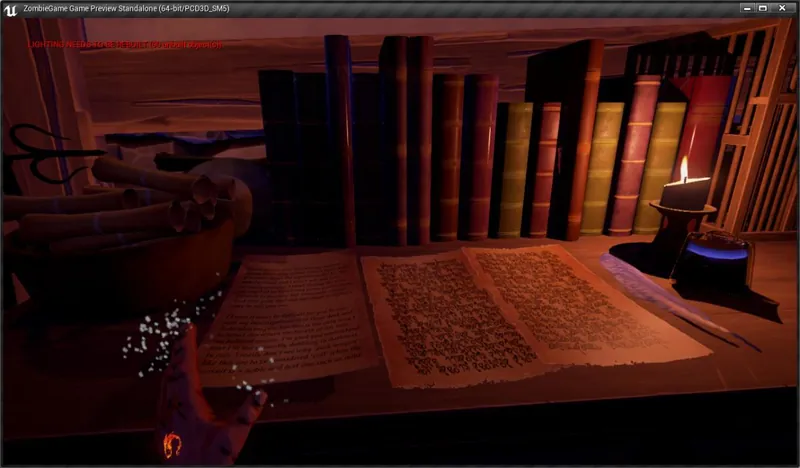I've been procrastinating on writing an entry for the month of November due to some disappointments. I might as well get it out into the open. Before we get into that, I'd like to share some recent screenshots from the game:
End Boss Monster: He looks astonishingly large in VR
Shrine where you exchange spirits for new spells
Hidden fire shrine in the dark forest
Upstairs study in wizard tower. You can interact with game objects.
After the Seattle VR conference at the very end of October, I was contacted by a representative for HTC. HTC is one of the joint producers for the HTC Vive VR headset, which is a great piece of hardware. One of their legal reps liked my game enough to contact their strategic corporate relations person, who then reached out to me by email and phone. We spoke for about 10 minutes, with some preliminary exploratory questions about my game and what we're both looking for. There were early talks of a joint partnership with HTC. If it goes forward, HTC would distribute my game for me with a revenue sharing agreement. My highest hope would be for my game to be bundled with the hardware during launch, though that was not specifically talked about and the realistic chances of that are extremely low. We agreed that there was mutual interest in further talks and that the corporate relations rep would visit our office early the following week to play through our game to see if it meets their vision and quality standards for VR content. Great! I was super excited. I looked forward to the following week, expecting to get the ball rolling. Monday comes and goes with no promised contact. As does Tuesday, Wednesday, Thursday, etc. I send out an email to see what happened. No response. Okay, I will just wait a few more days and then send another email. No response. Rinse repeat, every week, with the same results. A month has gone by. What happened?! I know my emails aren't going into a spam folder because the rep said earlier that they saw my messages. I can only imagine that they're super busy and I've just fallen through the cracks or it turns out that I am just a very, very low priority for HTC. That's gotten me disappointed and sad. If I'm going to be rejected, I'd at least like it to be done firmly and with certainty rather than leaving me guessing.
Okay, what about sending off some messages to the corporate relations people at Oculus? Maybe I've got a better chance with them? I send off an email, after a brief twitter exchange. It goes into a black hole and I never hear a word. I suppose unsolicited emails are junked, especially if you're a nobody. Reality check: Nobody has heard of me, my game, or what I've done. I shouldn't be surprised if nobody isn't trying to break down my door to talk to me.
Alright, let's bounce back from this. I don't actually *need* either companies support. I'd like it a lot, the press would be very welcome for the future sales of my game. But really, I can go it alone. I've got Steam. I can greenlight my game and distribute it myself. Why share revenues with people who contribute 0% to my game production? The only reason would be market reach. I don't have any marketing power, so that's going to be my greatest limiting factor. That *should* be somewhat easy to overcome by posting some tantalizing game play content on various online portals. I may not just be limited to releasing on Steam either. If the Oculus store actually gets enough traction, releasing my game on there would be a pretty good decision. HTC is attempting to start their own digital storefront as well, so I should consider releasing on there as well. The bottom line is that even without strategic partnerships, I have lots of solid opportunities to be successful.
I think the worst business decision would be to sign an exclusivity deal with either Oculus or HTC because that limits my market reach. Suppose that VR takes off slowly, with maybe one million headsets sold in 2016. If Oculus has 50% market share and HTC has 50% market share, and I sign an exclusivity contract with one of them, then my maximum possible sales would be 500,000 units sold. If, realistically, I can actually only reach 10% of the total VR market (which is probably being generous for my lack of marketing), I'd be looking at about 50,000 units sold (under an exclusivity contract). If however, I refuse to go exclusive, then my sales ceiling is the whole VR market instead of being segmented to a particular platforms market reach. In more likelihood, the actual market share split between HTC and Oculus won't be an even 50/50 split, it may be more of a 70/30 split, and we don't know which side it will skew towards. Signing an exclusivity deal with the wrong horse could be a fatal mistake for business. The hardware manufacturers probably won't see it that way though, it's in their own best interests to lock developers into exclusivity contracts so that their hardware platform has the most diverse range of rich content for end users. I half expect some shady shenanigans, so I will have my legal helpers inspect every contract and agreement to protect me.
My finances are my top worry right now. I've projected that I will completely run out of money some time in February. I won't be able to pay rent or buy food, so things will get pretty grim. That puts some pretty big pressure to wrap up production on this game and leaves next to nothing for a marketing budget. This is a less than ideal situation to find myself in. But, I have between now and February to figure out a resolution. I'm confident that I've got one of the "better" VR titles on my hands. It's not the best VR title (that goes to EVE: Valkyrie), but it will be in the top 50%. If we can finish this game to a high degree of polish, and "do it right", I have a good feeling it will do well on the market. That causes me to be wary about making financial agreements with investors.
If another company or venture capitalist is going to invest in my company / product, then they will want equity in the company, and that equity will be based off of a market valuation. Let's pretend that my company valuation is $750k right now. If I need to raise $100k, I would have to sell 13% of my company. Now, let's say that I hold out and release my game in a few months. Sales do well enough. I make enough money off of sales to at least pay off my monthly expenses. I didn't have to give up 13% of my company equity, I released a VR game, thus establishing myself as a legitimate player in the VR industry, and I have the capability of reaching out to my customer base and releasing free content updates. Gradually, my sales numbers increase as does my fan base, and I become "established". The skill and experience of my team increases, and we become much more valuable as a whole. Perhaps now, our valuation is at $2m instead of $750k. Now, giving away a 13% equity stake is worth $266k instead of $100k. But, that's assuming that we actually need to sell equity because we're still cash strapped. Most likely, we won't be strapped for cash if we keep our team small and our costs low. If our first game release lets us be financially self-sustaining, that allows us enough resources to build a second VR game (which I already have designed). So, trading company equity for cash at this point in time is a desperate short term resolution which I'd like to avoid. I'd much rather trade equity when our company valuation is much, much higher.
Loan: At this point, I'm most seriously looking into taking out a loan from the bank. I can get enough to finish my game to the quality standards it needs to be at and I don't have to give up any company equity at such an early stage. If the game flourishes in the market as I expect it to, then the loan is just borrowing against the future earnings with interest. This is a pretty ballsy risk though, because if the game fails, I'm still on the hook for the principal and interest, and if I can't pay it off, my credit is ruined. The bank loan is an attractive option though because it has a higher chance at success than alternative fund raising options.
Epic Grant: At the whim of Epic, I may be able to receive up to $50k in grant money. I don't think anyone has gotten the full $50k. The average pay out is around $14k. That would buy me about two extra months. I will submit my game, but I want to maximize my chances for success by pushing the production as far as my existing resources will allow. If I can get the game to 90% complete, a few extra months of time may be the only push I need to get to 100%. I really love Epic and what they stand for. I hope to have a long future of doing business together, whether I get a grant or not.
Kickstarter: Yeah, right. The feasibility of this option is decreasing month by month for everyone across the board. Kickstarter is over saturated with games. It's really just fundraising which is based on your internet popularity. I have none. I have 18 twitter followers, 2 youtube subscribers, and zero social media exposure. If I launch a kickstarter campaign, it's going to take a month of full time preparation, followed by a month of waiting, for a coin flip chance that I'd hit my funding goal. But, that does tell me something important about my game -- if I have next to zero social media exposure, then launching my game is going to be an uphill marketing battle. The time to start producing marketing material and generating that consumer product awareness is right now. Launching a kickstarter campaign also comes with a bit of an opportunity cost: If I spend a month creating, launching and managing a kickstarter campaign, that's a month that I'm not spending on the production of my game. There's a high chance that the kickstarter campaign would fail, so the risk of failure is high and so are the costs. It could work, but it's a bigger risk.
Steam Early Access: Out of principle, I'm opposed to "Early Access". I think you only get one first impression, so if your early access title is incomplete (as it's guaranteed to be by nature), then there's a good chance that the first impression you create is a bad one. I'm also very worried about releasing broken games. Early access also has a bit of a stigma attached to it as well because other developers have abused it so much. There are a lot of unfinished and abandoned games, which means consumers get robbed. Then there's also a question of "when does a game move out of the early access status?". Is it when the game is content complete? Or when every feature and capability has been developed? In my case, my game has about 30 minutes of game play. It's a single player narrative driven FPS. I want to layer on more narrative content. I want to add additional game play modes (as challenges). I also want to add in multiplayer modes, where you can play co-operatively or in death match mode. To add those extra capabilities would cost several extra months of development time, which I obviously can't afford with my current finances. But, the benefit of the early access is that I'd get some early sales and be able to start that all important dialogue with paying customers, and changing the game design / features to support what the customers are asking for. I think, if I'm going to release under "early access", I'd want a complete and playable game -- which by definition, wouldn't really be 'early access', right? I suppose in my case, it would be a way to manage customer expectations. I don't have any QA, so if I release under early access for a month and let consumers be my QA, I could strike a bit of a balance on my lack of resources. Whatever the case, the "wrong" reason to run with early access is out of desperation to resolve the financial pressure.
Anyways, I want to talk a bit about my planned project roll out for a bit. If you aren't following the VR industry very closely, I'll give you a quick brief.
HTC will be doing a limited release for the HTC Vive headset in April 2016. This headset comes with two hand held wands, one for each hand. The hardware platform is a "room scale" VR experience, where you can walk around in a 15 foot by 15 foot room, while swinging your arms around wildly. As of today, very few developers actually have a Vive to work on. One of the game design challenges for me is to figure out how you can create an FPS which is playable within a 15x15 foot physical room, which the player is restricted to. To me, the most appealing part of the Vive is the hand controllers. The HTC hand controllers are the best solution for using your own hands within VR since there are no occlusion issues.
Oculus will be launching their consumer version in Q1 2016. This is old news and I fully expect that deadline to slip into Q2 instead (especially because HTC slipped), and if I'm being a pessimist, Q3. They are also shipping hand held controllers for their VR headset. These hand controllers are unavailable to just about every developer at this time. I think each one has to be custom made at the moment, so only the game engine teams and very select few high profile developers are the ones with access to them. Despite that, my game would be a perfect use case for their hand controllers.
Leap Motion is a hardware input device which I am currently using to track hand positions in VR. I don't like the Leap Motion hardware. The problem is that it is very sensitive to interference and has performance problems. It's also mounted onto the face plate of the Oculus Rift and has a limited field of view (120 degrees, +/- 10). Through testing, we've found that people will move their hands back behind their head to throw a fireball but the Leap Motion device loses tracking of their hand. The hand gesture recognition is also very finicky, so there's a lot of false positives. When you play our game, half the time you're fighting against the hardware trying to get it to recognize and respond to your intended actions. This is less than ideal, so I'm treating the Leap Motion device (as it is now) as a temporary stop gap measure to solve the hand controller interface in VR.
I fully plan to support both the Oculus Rift with their half moon hand controllers and the HTC Vive with their wand hand controllers. The only two things which are currently stopping me from doing it right now is limited finances and no access to the hardware. It's most likely going to be the case that I won't be able to build in support for the various hardware platform configurations until after the hardware has been released to the mass consumer market in Q1/Q2 2016.
As far as project progress goes, we're getting a lot closer to completion. I'd tentatively say that we're 80% there. I believe that by mid to late January, our game will be feature complete. The following month will be polishing and QA testing, followed by a launch of version 1.0. In mid January, I hope to launch our Steam Greenlight campaign (need to shoot video and edit it for game play trailer). I'll be posting an announcement and link to the greenlight page when it's up. We'll also have a historic first launch party and invite everyone who has been directly and indirectly involved in the production of this game, and I will be giving lots of public thank you's and recognition to people by name. The work won't stop after launch, we'll be busy monitoring community response and patching any bugs which pop up, and transitioning into working on free content updates and game promotion.
It's going to be a hard and scary road ahead in the coming months... Will I be homeless or can I breathe a sigh of relief? Until then, I will be working every day as much as I can.





Good luck sir! Putting everything on the line is a ballsy maneuver. Here's hoping to a smooth road to your ship date.
I haven't shipped a title yet, so please take my advice with a grain of salt. But I have read many Post Mortums and nearly all of them say they didn't start marketing soon enough. You've identified this as a potential problem, so I hope you're doing something about it. (Somehow without impacting development time.)
It's awesome that you're one of the early titles, and your game looks really cool. These factors might be enough for that magical marketing tipping point, but you should probably "do marketing" whatever that is. :)
I feel like the poor controls are a very high priority issue. Especially for VR games. If you do manage to get your game into gamer's hands, they're going to be brutal with their reviews. When I read your statement, I got the impression of a parent looking at their child with rose colored glasses. They might be aware there's a problem, but they minimize its importance.
These are just my thoughts and it looks like you've got a plan. Please don't let my arm-chair-project-managing add to your stress levels. I think you've got a decent shot.
Again, good luck,
- Eck